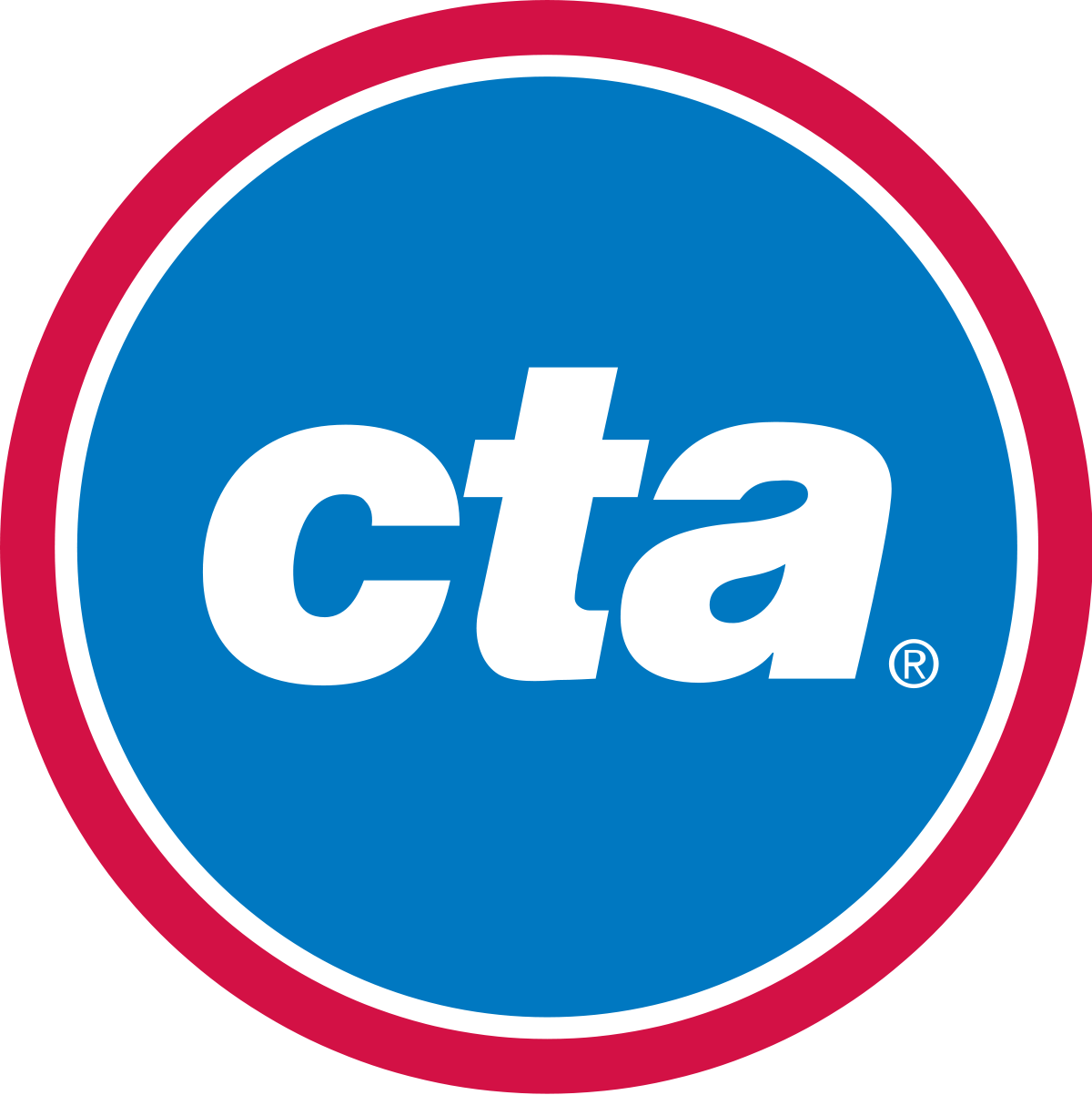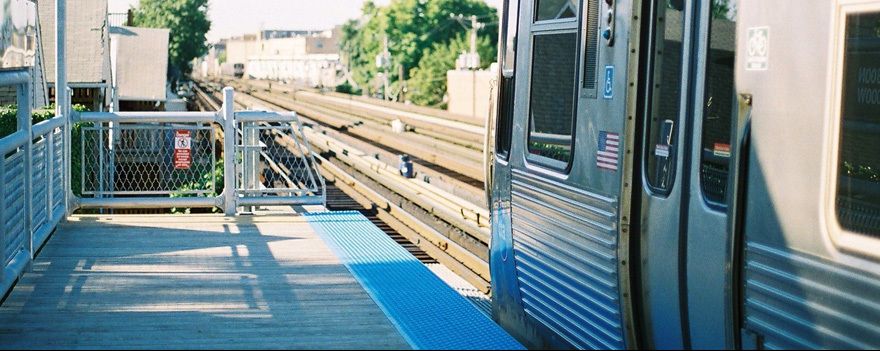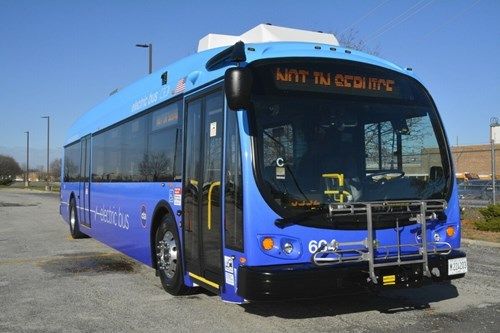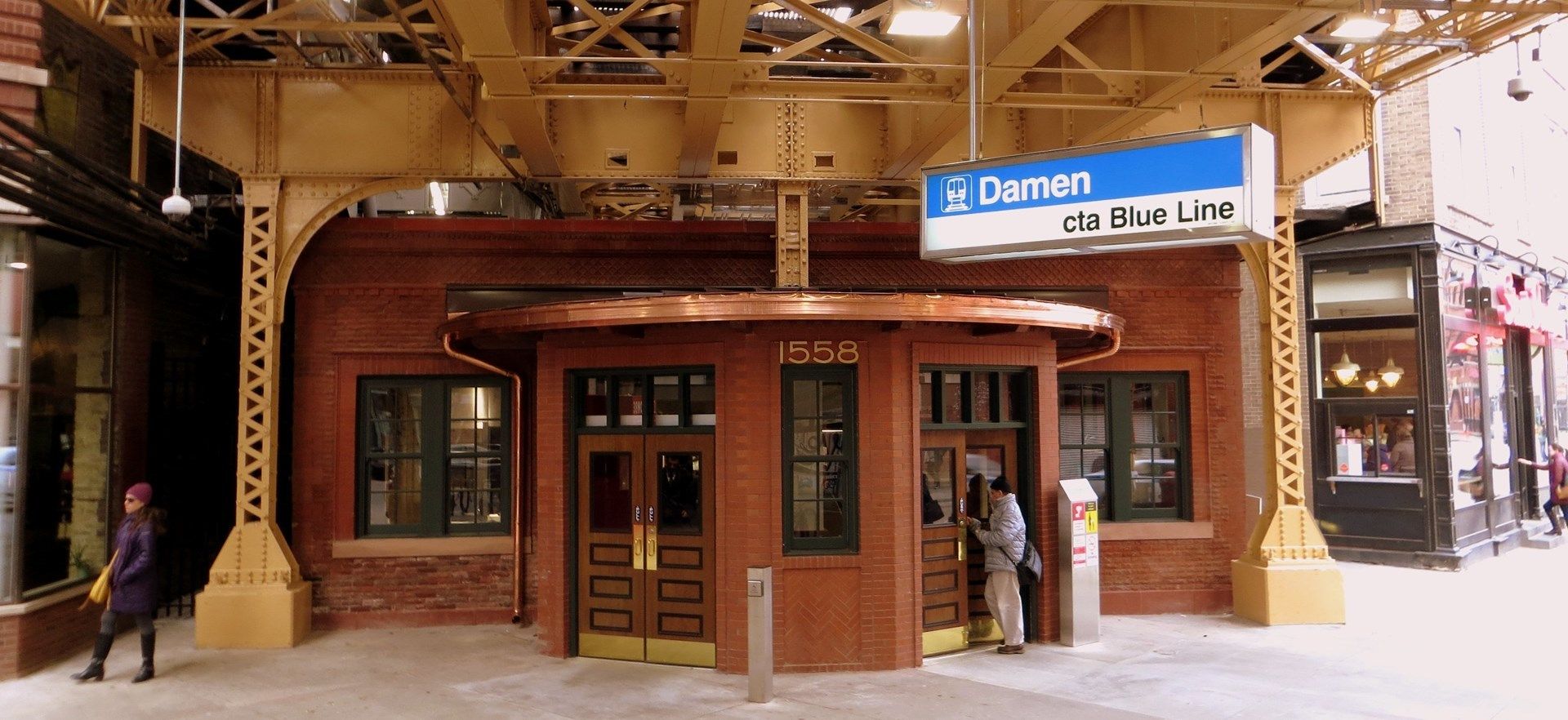About
Learn about Chicago Transit Authority including our ESG Program, News & Press Releases, Projects, and Team.
Talk to us
Have questions? Reach out to us directly.
Learn about Chicago Transit Authority including our ESG Program, News & Press Releases, Projects, and Team.
About Chicago Transit Authority
- Ridership as of 2022
- 243.5 Million
- Debt Obligations as of 9/1/22
- $4,928,230,402
- FY2024 Operating Budget
- $1.99 Billion
Organization
Chicago Transit Authority is an independent governmental agency created by state legislation. CTA began operating on Oct. 1, 1947, after it acquired the properties of the Chicago Rapid Transit Company and the Chicago Surface Lines. On Oct. 1, 1952, CTA became the predominant operator of Chicago transit when it purchased the Chicago Motor Coach system.
Governance & Oversight
The governing arm of the CTA is the Chicago Transit Board. The Board consists of seven members, with four appointed by the Mayor of Chicago and three appointed by the Governor of Illinois.
The Mayor's appointees are subject to the approval of the Governor and the Chicago City Council; the Governor's appointees are subject to the approval of the Mayor and the Illinois State Senate. CTA's day-to-day operations are directed by Dorval R. Carter, Jr., President.
The current Mayoral appointees are Lester L. Barclay, Alejandro Silva, Michele A. Lee and Rev. Johnny L. Miller. The current gubernatorial appointees are Rev. Dr. L. Bernard Jakes and Rosa Y. Ortiz. There is one gubernatorial vacancy.
Lester L. Barclay serves as Chairman of the Chicago Transit Board.
CTA generates revenue from both farebox collections and nonfarebox revenues, and also receives supplemental funding for operating expenses through the Regional Transportation Authority (RTA).
The RTA was established in 1974 to oversee local transportation operators in the six-county Chicago metropolitan area. Illinois state law requires the three RTA service boards— CTA, Metra (the suburban rail system) and Pace (the suburban bus system) — to recover collectively at least 50 percent of operating costs from farebox and other system revenues.
Service Overview
The Chicago Transit Authority (CTA) operates the nation’s second largest public transportation system, providing mass transit services within the City of Chicago and 35 surrounding suburbs. The service area of the CTA has a population of approximately 3.2 million. Historically, the CTA has carried over 81 percent of the public transit riders in the six-county northeastern Illinois region, which includes the Counties of Cook, DuPage, Kane, Lake, Mchenry, and Will. Transit services provided by the CTA are part of the regional public mass transportation service system in the Northeastern Illinois Transit Region provided through the independent operations of the CTA, the Commuter Rail Division ("Metra") of the Regional Transportation Authority (the "RTA"), and the Suburban Bus Division ("Pace") of the RTA (the CTA, Metra, and Pace).
Strategic Goals
Considering the mission statement and core values, the CTA created three overarching goals, which were applicable in the past and will continue to be so in the present and future.
- Safety – CTA aims to ensure that customers and employees have a safe and secure transit system and workplace that prioritizes safety over all aspects of service delivery
- Customer Experience – CTA places a high priority on putting the customer at the center of every decision made and action taken to ensure its services meet or exceed customer expectations
- Workforce Development – CTA invests in its workforce to build on past successes and works toward a bright future creating job and learning opportunities with a focus on Diversity, Equity and Inclusion (DEI)
Image Gallery
ESG Program
Learn about our environmental, social, and governance program, and how we bring those values to life with green bonds, sustainable projects, and more.
News
News
February 7, 2025
The Driving a Cleaner Illinois – Volkswagen award is the largest grant to date from the Illinois Environmental Protection Agency
MARKHAM, IL, FEB. 7 – Earlier today, Governor JB Pritzker and the Illinois Environmental Protection Agency (IEPA) joined Pace and the Regional Transportation Authority (RTA) at Pace’s new state-of-the-art Markham Campus Bus Acceptance Facility to celebrate a $27 million award to Pace for the purchase of electric buses and $31.25 million to the RTA (for the Chicago Transit Authority) through “Driving a Cleaner Illinois.” The Driving a Cleaner Illinois – Volkswagen grant opportunity for electric buses to the RTA region are the largest grants that IEPA has announced from the program to date; the previous high was $14 million.
Pace will provide a $9 million match and the RTA will provide a $10.42 million match to the IEPA award. Pace will purchase 27 battery-electric buses (BEBs), and the Chicago Transit Authority (CTA) will purchase 30-all-electric transit buses to replace the oldest diesel buses in their fleets.
Honored speakers included Governor JB Pritzker, State Senator Napoleon Harris, Markham Mayor Roger Agpawa, IEPA Acting Director James Jennings, RTA Chairman Kirk Dillard, Pace Chairman Rick Kwasneski, and Pace Executive Director Melinda Metzger.
Other guests included State Representative Bob Rita, State Representative Matt Hanson, IDOT Acting Secretary Gia Biagi, Cook County Commissioner Donna Miller, Cook County Commissioner Dr. Kisha E McCaskill, University Park Mayor Joseph Roudez III, and representatives from U.S. Senator Tammy Duckworth’s Office, U.S. Congresswoman Robin Kelly’s office, State Senator Kyle Hasting’s office, the Village of Robbins, South Suburban Mayors & Managers Association, Chicago Southland Economic Development Council, and South Suburban College.
By transitioning to a zero-emission fleet, our region’s public transportation system aims to significantly reduce harmful pollutants, contributing to healthier communities and a greener future. Pace Chairman Rick Kwasneski welcomed guests and said, “Public transit is more than just buses — it’s about connecting people to jobs, schools, healthcare, and opportunity, and being a good steward of our environment. We are grateful to the Governor’s leadership, which ensures critical, clean energy initiatives move forward."
“Illinoisans of all backgrounds depend on Pace and the CTA. Whether commuting to work, visiting friends and family, or running their everyday errands — the convenience and efficiency of these systems is absolutely essential to their everyday lives,” said Governor JB Pritzker. “Pace has added 27 new, fully electric buses – along with 30 that will join the CTA fleet. This is an investment that will help us meet our climate goals, create opportunity for our people, and further connect our communities. Electric buses are vital to the future of transit — clean, reliable, and convenient — and I’m excited to be taking a step toward that future today.”
“Transit is the strongest tool we have in the fight against climate change, and we are grateful for the partnership of the IEPA in leading that fight,” said RTA Board Chair Kirk Dillard. “This investment will improve service and provide cleaner air for Pace and CTA riders in the short term and in the long-term, help us lower greenhouse gas emissions.
“RTA is committed to leading regional grant applications in the future to advance key transit capital priorities for our region,” Dillard continued. “This award from IEPA takes us another step further in meeting our regional commitment of reaching a zero-emissions bus fleet by 2040.”
Driving a Cleaner Illinois is the IEPA’s grant program developed to distribute funding for various types of mobile source electrification projects. The Driving a Cleaner Illinois Program implements funding from a variety of sources, including the Climate and Equitable Jobs Act, the Volkswagen Environmental Mitigation Trust, and U.S. Environmental Protection Agency’s Diesel Emission Reduction Act (DERA) Program.
“We are thrilled to see this state investment in transit that will allow us to make even greater strides toward our vision of a zero-emission system,” said RTA Executive Director Leanne Redden. “This award not only allows the CTA to make significant progress on greening its bus fleet, but it also helps to enhance service and reliability for all bus riders.”
Grant awards from IEPA to RTA and Pace will be incorporated into the RTA 5-Year Regional Capital Program later this year and future service board bus purchasing plans will incorporate these grants to receive new electric buses in the near future.
“We are grateful to the IEPA and RTA for helping CTA to advance our goal of converting to an all-electric bus fleet — a complex and challenging undertaking that includes replacing 1,800 buses and making the upgrades and capital investments necessary to support them,” said Acting CTA President Nora Leerhsen. “These grant funds will make a significant contribution towards a greener future for CTA as we move ahead with ‘Charging Forward: CTA’s Bus Electrification Planning Report’ — the first-ever roadmap for the full electrification of our entire bus fleet.”
The Illinois EPA has been designated as the lead agency to administer funds allocated to Illinois from the Volkswagen Environmental Mitigation Trust. Illinois’ initial allocation of funds is approximately $108 million to be used to fund mobile source diesel emission reduction projects. The funds are to be used for projects that reduce emissions of nitrogen oxides in Illinois.
“Emissions from diesel powered transit buses negatively impact air quality in the communities they serve and the region as a whole,” said Illinois EPA Acting Director James Jennings. “Through the VW settlement funding and additional cost-sharing commitments from both Pace and RTA/CTA, these projects represent a $77 million investment in clean transportation that will benefit communities throughout the Chicago area.”
“This investment will provide climate-friendly transit options that improve mobility and quality of life for people across the region,” said Acting Illinois Transportation Secretary Gia Biagi. “Under Governor Pritzker’s leadership, we are working closely with our transit partners to make our entire transportation system safe, reliable, and green.”
“It's refreshing to see how something that began as a challenge for Volkswagen has been turned into a positive force for change, furthering both our region’s and the state’s pollution reduction goals. This transformation underscores the real impact of investing in clean transportation solutions,” said Pace Executive Director Melinda Metzger.
News
January 16, 2025
Longtime CTA chief of staff Nora Leerhsen to take over as acting president when Dorval Carter Jr. retires
CHICAGO (CBS) -- The Chicago Transit Authority announced Wednesday that chief of staff Nora Leerhsen will take over as acting president of the transit agency when current President Dorval Carter Jr. retires at the end of the month.
"I look forward to serving our riders and employees in this new role. This is a critical time for our agency and for the future of public transit," Leerhsen said in a news release. "As acting president, I will build on our accomplishments as an agency and am confident that we are up to the task of carrying CTA successfully through this transition."
Leerhsen takes over the role on Sunday, Feb. 1, the day after Carter's retirement.
The CTA noted that Leerhsen is the first woman to lead the agency in its 77-year history.
She has been with the CTA since 2014, and served in her first four years several capacities—including senior advisor to the chief of staff and chief operating officer and deputy chief of staff. She also worked in the CTA safety and law departments on agencywide audits, ethics matters, and safety compliance, the CTA said.
Leerhsen became chief of staff of the CTA in 2018. In that role, she has overseen all operations—including service delivery, capital planning, employee programming, and communications strategy. She also served as the primary liaison to the Mayor's office, CTA Board, Chicago city departments and agencies, and RTA and service boards.
Leerhsen holds a law degree from the University of Wisconsin-Madison., a master's degree in social science from the University of Chicago, another master's degree in education from Chestnut Hill College in Philadelphia, and a bachelor's degree from The George Washington University in Washington, D.C.
Carter announced Monday that he will be retiring at the end of the month after 40 years of service in public transportation. He is leaving the CTA to become the head of St. Anthony Hospital in North Lawndale.
Carter has been on the job nearly 10 years, but over the last year, pressure has been ratcheted up to remove him amid questions of safety, cleanliness, and timeliness of buses and trains. He faced criticism, and calls for his resignation made headlines last year.
News
January 15, 2025
RTA releases “Transforming Transit,” a vision for $1.5 billion in additional annual operating funding, which could lower customer wait times by 50 percent, improve public safety, and create the seamless transit system the Chicago region deserves
CHICAGO, January 15, 2025 – Announced with a speech by Chairman Kirk Dillard at the City Club of Chicago today, the Regional Transportation Authority of Northeastern Illinois (RTA) released “Transforming Transit,” a $1.5 billion vision aimed at shaping the future of transit funding and governance ahead of the 2025 legislative session which must resolve transit’s historic funding gap.
Like many other transit systems across the country, the Chicago region’s system is facing a fiscal cliff beginning in 2026. The $770 million gap represents 20 percent of the regional operating budget. The Illinois legislature must put forth a sustainable funding solution by the end of its spring session this May to avoid service cuts and fare increases at catastrophic and unprecedented levels. The agency, along with CTA, Metra, Pace, the Chicago Metropolitan Agency for Planning and advocacy organizations, are advocating for $1.5 billion in new annual operating funding from state and local sources to not only fill the budget gap but double down on service in ways that will increase ridership, stimulate the economy, and mitigate climate change. “Transforming Transit” lays out what improvements to the system could be possible with this level of sustainable operations funding coupled with governance reforms aimed at improving rider experience regionwide.
“Our regional transit system has been drastically underfunded for decades; while systems in New York, Boston, and Philadelphia get up to 50 percent of their funding from their state governments, state funding here makes up about 17 percent,” said RTA Executive Director Leanne Redden. “We know our riders deserve world-class service. To provide it, we need to secure sustainable funding. And this document describes exactly what our riders and our region could get out of this level of investment.”
Up to 50 percent reduction in wait times
With $1.5 billion in additional operating funding from state and local sources and continued capital investment, service investments would include more frequency on existing routes, route extensions, more routes offering weekend and off-peak service, or new routes. Adequate funding would allow a strengthened RTA to oversee region-wide service standards that cut customer wait times for transit by as much as 50 percent. Examples of potential rider impacts include:
- City rail wait time of 3-6 minutes: The ‘L’ could operate every 5-10 minutes all day, every day. This predictability means more convenient service midday, evenings, and overnight throughout the week.
- City rapid bus wait time of 4-8 minutes: City rapid bus service could run every 10 minutes or less all day, every day on at least 40 routes. This means faster bus service on these corridors for all trip types, not just during rush hour.
- City local bus wait time of 6-12 minutes: Local buses on less busy corridors could run every 15 minutes or less, serving as feeder routes to rapid bus and rail stations. This level of frequency connects riders to the regional network with a single transfer.
- Regional rapid bus wait time of 7-15 minutes: Regional rapid bus service routes could run every 15-30 minutes seven days per week. This can connect riders to employment centers and other destinations with faster service, especially where rail service is not available.
- Regional rail wait time of 15-30 minutes: As commuter rail services transition to a regional rail service structure, it could lead to an increase of frequency on select lines to 30-60 minutes all day every day—not just during rush hour. This means reducing midday gaps in service and increasing evening and weekend service.
- Regional local bus wait time of 20-30 minutes: Regional local bus service could run every 45-60 minutes seven days per week. This means better service on weekends, midday, and evenings and better connections to rail lines.
More frequent, reliable and expanded service will be transformative for transit users, saving time and money while opening new possibilities on travel and connection across the region.
Historic restructuring of the region’s transit governance
The RTA is proposing a historic restructuring of the region’s transit governance to maximize the impact of new operating funding and ensure all riders experience an improved, reliable, efficient, integrated transit network.
While seeking new funds, the RTA is working with CTA, Metra and Pace to increase efficiencies and achieve cost savings. RTA is proposing that any new operating funding beyond filling the budget gap can only be used for operations to improve and expand service—not to fund administrative or management positions.
A stronger RTA would play a key role in saving costs through consolidating similar functions. The RTA estimates overhead efficiencies of $50 million a year. Additionally, a fare increase of 10 percent would generate $50 million, bringing the agency and rider contribution to partly addressing the cliff to $100 million.
A fully integrated and accountable regional transit system
Rather than distributing key responsibilities across organizations as is done today, the RTA’s proposed reforms would result in one agency—the RTA—being accountable to riders and legislators on the most important systemwide issues: fares, service quality and capital investment. State law currently does not empower the RTA to engage proactively in these interrelated areas and doesn’t grant the agency the authority to institute changes and improvements throughout the year.
“Transforming Transit” envisions these reforms resulting in a regional fare policy established by the RTA, regional service standards and enforcement mechanisms, and capital project prioritization based on RTA evaluation and level of need.
Integrated fares and customer service
To transform the customer experience, a strengthened RTA would serve as the rider hub for fares and customer service, combining many free and reduced fare programs into one and creating the potential to launch additional enhancements, such as a single, unified regional app to ensure access to simple, easy-to-understand fares and discount programs for all riders. Additionally, future investments in rider information solutions can be centrally located at the RTA. For example, this could take the form of:
- Better digital signage at transit stations and stops, with arrival information from all relevant operators
Fast, reliable service guaranteed by a single accountable public agency
To realize the vision of transforming the regional transit system, a strengthened RTA with the additional $1.5 billion in annual funding would set minimum performance standards for efficient, reliable and safe transit services in different parts of the region. These standards would include required levels of coverage, hours and frequency by mode and geography, and funding would be allocated in part by operators’ ability to deliver service that meets standards. For example, this could look like:
- RTA engaging third-party operators to fill service gaps including providing vouchers to riders for first and last mile gaps or cancelled service
Capital project prioritization
To fully leverage a transformational investment in transit service, a strengthened RTA would evaluate all major capital projects on key metrics including impact on accessibility, job access, equity and climate as part of project selection and inclusion in the five-year capital program. For example, this could mean:
- RTA leading planning for projects that cross operators and geographic boundaries, achieving a level of coordination and advocacy that would win scarce federal grant dollars
Transforming transit
The vision set forth in “Transforming Transit” is only possible with $1.5 billion annually from state and local sources. If provided the funding to do so, the RTA is prepared to lead, delivering the system riders deserve.
“A Chicago where public transit isn’t just an option, but the obvious choice for travel, is within our reach,” said RTA Board Chair Kirk Dillard. “Frequency unlocks freedom; the freedom to step outside and trust that a bus or train will be there. It’s the kind of freedom that transforms a city, connects a region, and opens doors to opportunity for everyone.”
Projects
View All Projects
Team

Nora Leerhsen
Acting President
nleerhsen@transitchicago.comView Bio

Tom McKone
Chief Financial Officer
tmckone@transitchicago.comView Bio
Talk to us
Have questions? Reach out to us directly.





